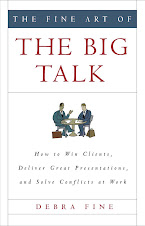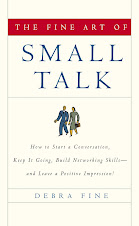The Denver Post this week published an interesting article, which featured some local communication experts weighing in on the social media's effect on communication. This is a very relevant topic in today's digitally-dominated communication world, so take note.
Are Social Media Making Us Tone Deaf?
By Sheba R. Wheeler
How many different ways could a person go wrong with a Facebook status update like this one:
"At the doctor's office. Hope everything is OK."
Within minutes a response pops up from one friend — and another and another: "OMG. What's wrong????"
When she read this post, Denver author Debra Fine feared her sister was seriously ill and started to panic. A few minutes later, Fine's sister replied again on Facebook:
"What do you mean what's wrong? I'm just here for my physical."
"My sister was spouting thoughts that had no nuance, no volume, no tone, no pacing. This is definitely an example of how not to communicate through social media," says Fine, author of the "The Fine Art of Small Talk" (Small Talk Publishers, $12.95). She's completing the research on her third book, "When Texting Is Not an Option."
Despite all the ways we have to stay connected — from texting to tweeting to talking — people still have a hard time figuring out when it's best to communicate through e-mails, phone calls or face to face. Each type of interaction has its pros and cons. But immediacy and lack of foresight often lead to carelessness that can come back to bite the sender.
Tiger Woods' infidelity was chronicled on alleged text messages shared with his numerous mistresses. And Kimberly Swann of Essex, England, made international news last year when she was fired after she said her office job was "boring" on her Facebook page.
"When you are talking to someone in person, you can smooth things over," Fine says. "But when something is texted, e-mailed, blogged or posted on a social networking site, that becomes concrete language that someone can use as evidence."
Fine used to work as an engineer. But her desire to learn better conversational skills kick-started her second career. She now teaches those skills to others in seminars, workshops and speeches.
Technology can enhance relationships if used correctly, she says. It can be used to stay in touch, set up appointments and have more meaningful conversations because frequent online posts keep everyone updated on life happenings.
The downside is harsher and hastier communication that can be easily misconstrued when people inappropriately use Facebook, e-mail, Twitter or instant messaging. People tend to be more demanding, gossipy and duplicitous while at the same time being less mindful of the needs and feelings of others.
You have to take the time to figure out exactly what is being communicated and then decide which vehicle will best help you get the result you want.
Confidential or intimate information shouldn't be shared on social-networking sites, Fine says. That includes breaking up with someone, delivering bad news, or dealing with personnel or financial matters. Opt for face-to-face.
"One of my clients told me she has received every single evaluation, assignment and discussion about upcoming meetings from her immediate supervisor via e-mail," says Sandra Lamb, the Denver author of "How to Write It," which includes a chapter on e-mail, electronic and online communication.
When something needs to be negotiated, explained or an immediate answer is needed, use the telephone, Lamb says. Use e-mail to give or request information. Use a conference call when dealing with multiple recipients to avoid the trap of forwarding e-mails back and forth.
Pause before you send
Think through what you are posting or forwarding and consider how it might be interpreted. Remember that people tend to see things in a negative light unless it's otherwise clarified, so the possibility of miscommunication rests on the person who pushes the send button, Lamb says.
"We are all very sensitive, and when a statement is made, we are looking for how we should interpret it," Lamb says. "In order to live in this new environment, we need to be more thick-skinned and ask for interpretations. Respond to an e-mail or post and ask what something means or if it was code for something else."
People also get tripped up about when it's wise to switch modes of communication, says Will Schwalbe, who with David Shipley co-wrote "Send: Why People Email So Badly and How to Do It Better" (Vintage Books, $14.95).
The default is often to communicate back in the same manner someone contacted you, but that is often a mistake, Schwalbe says. It's why a little tiff on e-mail can turn into a flame war.
"If someone sends you an e-mail that makes you furious, absolutely do not reply by e-mail," he says. "Pick up the phone, because if you reply by e-mail you will amp up the hostility level."
Similarly, call someone immediately if they are upset about a poorly worded e-mail or text that you have written.
If you are spending too much time with back-and- forth e-mails trying to get something explained, call or meet face-to-face, Schwalbe says.
Steer clear of sarcasm in your posts, because studies have shown that for every 10 sarcastic messages that are sent, at least one person won't get it and will take it at face value. Petulance or rage should also be avoided in tweets, in Facebook status updates, text and instant messaging because all those types of communication can be forwarded and saved.
Schwalbe is a big fan of using exclamation points in his electronic communications to convey his excitement. But he stays away from asking questions because they are often taken as criticisms in e-mails.
And the best advice for communicating? Cut each other some slack. A decade ago, few people were e-mailing. Now we communicate electronically hundreds of times a day. Mistakes are bound to happen.
"We may ruin relationships or burn a bridge without realizing it at all," Schwalbe says. "Be more thoughtful about the way we communicate with each other and take the extra minute to do it better. Then be more forgiving of people who don't do it so well."
Subscribe to:
Post Comments (Atom)




No comments:
Post a Comment